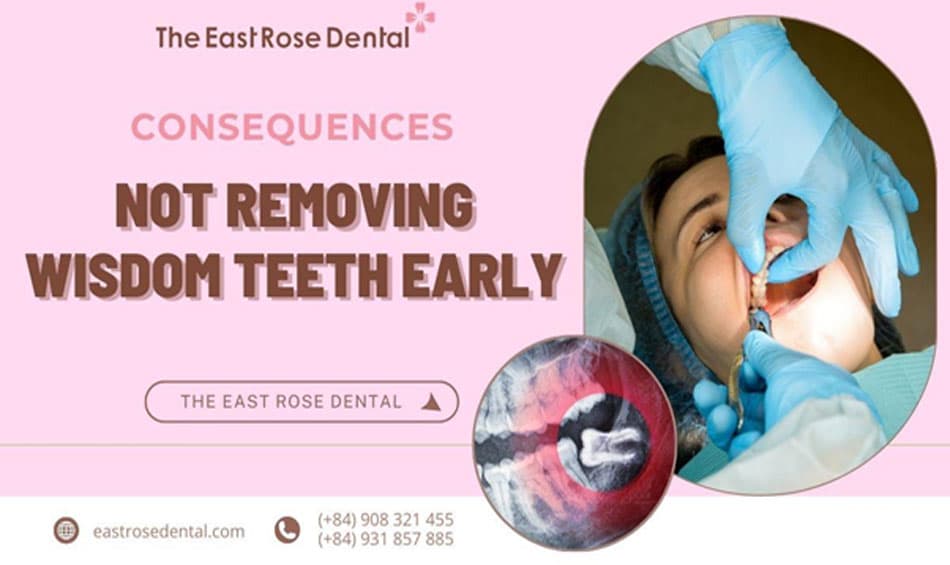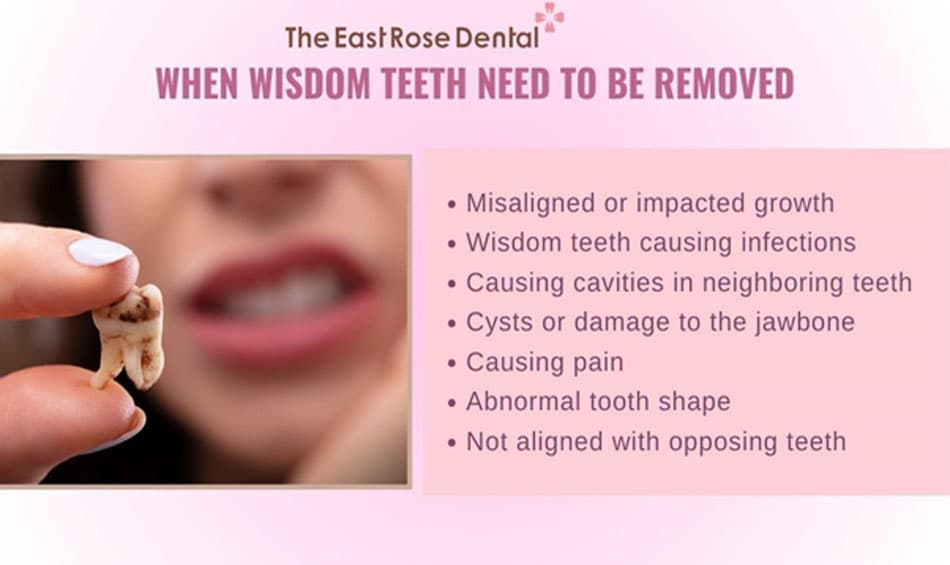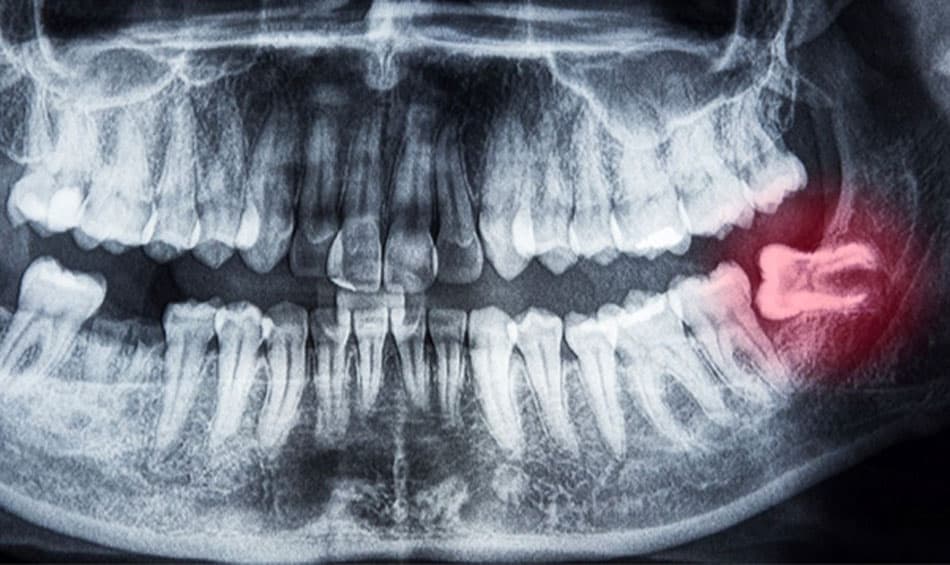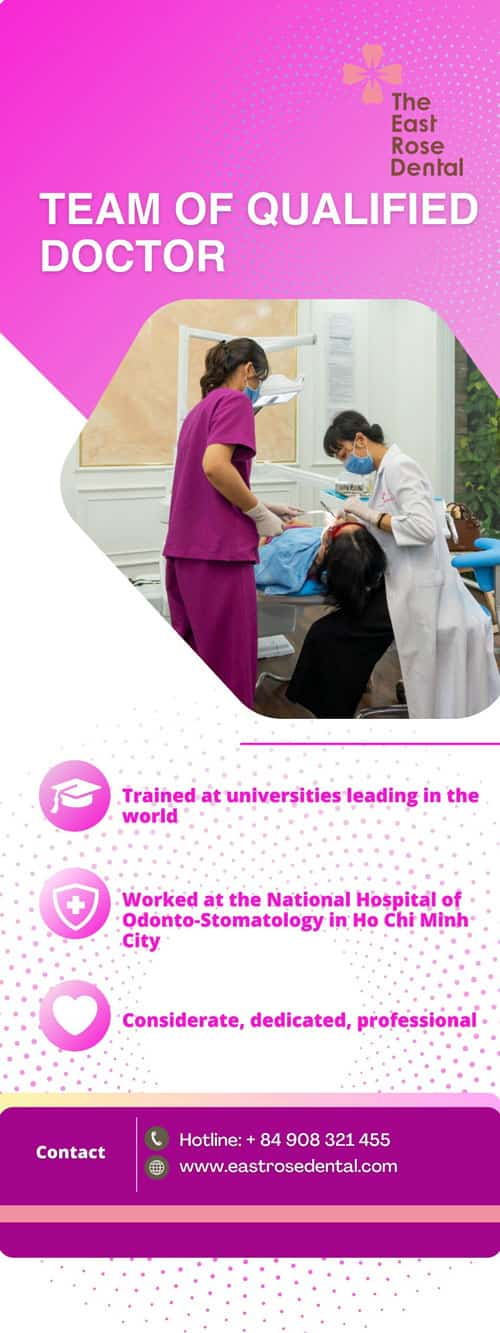When should wisdom teeth be removed and what the consequences of delay are
Wisdom teeth, also known as the 8th molars, grow in the innermost position of the jaw. Wisdom teeth are a common issue most people face between the ages of 17 and 25. However, not everyone is aware of the importance of timely removal. Therefore, The East Rose Dental will help you understand the serious consequences of delaying wisdom teeth removal and the necessary precautions when dealing with this situation.

What are Wisdom Teeth? The Role of Wisdom Teeth
Wisdom teeth, also known as the third molars, typically emerge between the ages of 17 and 25 and are located at the back of the jaw, behind the other molars. A person can have up to four wisdom teeth, with two in the upper jaw and two in the lower jaw. However, only a small percentage of individuals develop all four wisdom teeth, while others may only have one, two, or none at all. In theory, wisdom teeth can assist in chewing, enhancing the ability to grind food if they grow in the correct position, thereby improving daily eating function.
However, in practice, wisdom teeth often do not emerge straight and tend to grow at an angle or become impacted within the jawbone, leading to various issues, such as pain, infection, and misalignment of adjacent teeth. Due to their difficult-to-see location and typically limited space, wisdom teeth are more likely to cause problems rather than support the other teeth during chewing. This situation often leads many individuals to consider having their wisdom teeth removed to avoid complications related to oral health.
Cases Requiring Wisdom Teeth Removal

Not all wisdom teeth cases require extraction, but there are certain situations where removal becomes necessary to prevent dangerous complications for oral health. Below are cases where wisdom teeth removal should be considered:
- Misaligned or Impacted Wisdom Teeth: Wisdom teeth that do not grow straight often press against adjacent teeth or push into the gums, causing pain and discomfort. Misaligned teeth can also damage nearby teeth and alter the structure of the jaw.
- Wisdom teeth can cause gum and oral infections when they become trapped under the gums or partially erupted, providing an ideal environment for bacteria to invade. If left untreated, the infection can spread, threatening the health of the entire jaw and surrounding areas.
- Wisdom teeth can cause decay in adjacent teeth because they are difficult to clean, which often leads to cavities in neighbouring teeth. The accumulation of food and bacteria can lead to decay, affecting both the 7th molars and nearby teeth.
- Cysts or Jawbone Damage: In some cases, impacted wisdom teeth can cause tumors to form around the root. These cysts can damage not only the gums but also seriously affect the jawbone, leading to bone loss and other severe issues if not promptly removed.
- Prolonged Pain from Wisdom Teeth: Infections, cysts, or inflammation can lead to intense, recurring pain from wisdom teeth. In such cases, removing the wisdom teeth is the solution to end the pain and prevent further complications.
- Abnormally Shaped Wisdom Teeth: In some instances, wisdom teeth grow straight but have an unusual shape, leading to food becoming trapped between them and adjacent teeth. This can easily result in tooth decay and gum disease, making extraction necessary.
- Wisdom teeth that grow straight may not align with the opposing molars, resulting in inefficient chewing and potentially causing unwanted pain. Therefore, we recommend their removal in these cases.
Read more: Wisdom tooth extraction procedure: Is it dangerous?
Serious Consequences of Delaying Wisdom Teeth Removal
Many people choose to delay wisdom teeth extraction, believing it has no significant impact, but this can lead to dangerous consequences. Not only does it affect quality of life, but it can also result in severe health complications.
Causing Pain or Infection

When wisdom teeth grow misaligned or remain impacted beneath the gums, they often cause persistent pain and discomfort. Wisdom teeth, especially when trapped or partially erupted, can cause swelling and infection in the surrounding gum area. These infections can persist, resulting in severe inflammation in the jaw, mouth, and even throat. If left untreated, the infection can spread, causing significant harm to oral health and overall well-being.
Difficulties in Eating
Impacted wisdom teeth can exert pressure on adjacent teeth, disrupting the distribution of chewing force. Stuck or misaligned wisdom teeth can increase the risk of damage to the second molars, resulting in inflammation and pain. This not only reduces chewing ability but can also cause prolonged discomfort, making it challenging to eat, especially tough and chewy foods.
Damage to the 7th Molar
When wisdom teeth grow misaligned or remain impacted, they often press against the 7th molar—the large molar next to the wisdom teeth. This pressure can damage the structure of the 7th molar, leading to cavities or even enamel fractures. Continuous pressure from the wisdom teeth can harm the root and gums of the 7th molar, weakening it and making it more prone to breaking. This increases the risk of losing the 7th molar, which can negatively impact the chewing function of the jaw.
Misalignment of the Jaw

One of the serious consequences of misaligned wisdom teeth is that they can cause the entire jaw to shift. Wisdom teeth that do not grow straight can exert pressure on adjacent teeth, altering their positions. When teeth shift, it not only affects aesthetics but also impacts the chewing function of the jaw. Furthermore, this misalignment can lead to more serious issues, such as malocclusion or jaw displacement, making orthodontic treatment or dental interventions more complex and costly.
Increased risk of cavities and periodontal diseases
Due to their location deep within the jaw, cleaning wisdom teeth is quite challenging. Food and bacteria can easily accumulate in the small spaces around the wisdom teeth, leading to cavities. Additionally, if not properly cared for, wisdom teeth can also contribute to gum inflammation and periodontal disease. These conditions can spread to adjacent teeth, increasing the risk of tooth loss or severe infections.
Temporomandibular Joint Disorders
Improperly positioned wisdom teeth can lead to an imbalance in the function of the temporomandibular joint (TMJ). The pressure from wisdom teeth not only causes pain in the jaw muscles but can also result in symptoms such as jaw stiffness, clicking sounds in the joint when opening the mouth, and even radiating pain to the head and neck. This significantly affects quality of life and can lead to serious complications if not addressed promptly.
Cysts and Jawbone Damage
If wisdom teeth remain trapped in the jawbone without prompt removal, they can result in the formation of cysts around the tooth's root. A cyst is a fluid-filled sac located within the bone tissue, and over time, these cysts can grow larger, damaging the jawbone, nerves, and surrounding structures.
If left untreated, cysts can result in significant bone loss, weakening the jaw structure and even altering the shape of the face. Treating cysts often involves complex interventions, which may require major surgery and lengthy recovery times. Therefore, early removal of wisdom teeth is essential to prevent these serious complications.
Read more: 16 foods to eat after getting a wisdom tooth extraction
If not addressed on time, wisdom teeth can lead to numerous serious oral health issues. At The East Rose Dental Clinic, our team of experienced doctors is always ready to provide thorough examinations and recommend optimal treatment plans for each specific case. With modern technology and a professional care process, we are committed to delivering a gentle, pain-free, and safe treatment experience, allowing you to maintain long-term oral health without the fear of dental procedures.
Services
Working Time
- Monday - Friday: 08:00 - 19:00
- Saturday: 08:00 - 18:00
- Sunday closed
Contact Info
- Hotline 1: (+84) 908 321 455
- Hotline 2: (+84) 931 857 885
- Mobile: (+84) 8 3925 8778
- Phone: (+84)2 838 258 778
- info@dentalrose.net
- rosedentalclinicvn@gmail.com
 English
English  Tiếng Việt
Tiếng Việt

